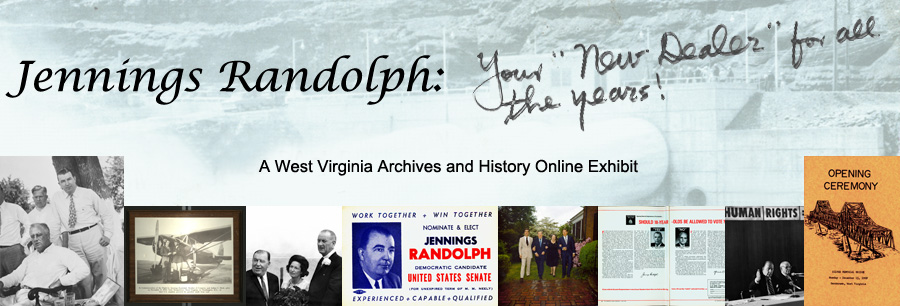
Chapter Five
|
". . . I’m not what you’d call a national Senator or international Senator." - Jennings Randolph |
|
With Richard Nixon’s rise to the presidency in 1969, Senator Jennings Randolph slowly began to lose some of his political influence. Randolph had served mostly Democratic presidents to this point in his career, but the office now shifted to the Republican Party. Although his party no longer held the presidency, Randolph continued to work diligently and managed to fulfil many of his career-long goals in his last years as a United States Senator.
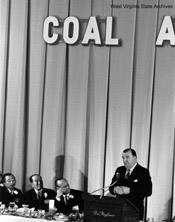
Jennings Randolph speaking at National Coal Association event, The Mayflower Hotel, Washington, D.C., n.d.
|
One of the achievements during the Nixon administration that involved Senator Randolph was the passage of the Federal Coal Mine Health and Safety Act of 1969. The legislation created a safer working environment for coal miners by requiring extensive inspections of both underground and strip mining sites and paved the way for the creation of the Mining Enforcement and Safety Administration (MESA), later renamed the Mining Safety and Health Administration (MSHA).1
A significant section of the act was Title IV, which led to the development of a Black Lung Benefits program that provided aid to incapacitated miners, widows, and dependents who were affected by Black Lung.2 Randolph, who was a sponsor of the original Black Lung Benefits program, authored and managed legislation in 1972 that liberalized the program, allowing many more afflicted miners to receive benefits. Along with this, Randolph was also at the forefront of legislation that led to a 20 percent increase for Social Security beneficiaries.3
|
"The approval or denial of Black Lung Benefits - the determination of disability - for a miner in many instances constitutes a matter of life and death. It often determines whether a miner and survivors will be able to maintain a half-way decent standard of living. Black Lung Benefits can mean the difference between adequate or substandard housing; sufficient diet or under-nourisment; and minimal medical care or no medical care for a miner and his family. An issue having such a bearing on the lives of people demands thorough and timely attention of Congress and further affirmative action." - Jennings Randolph, Black Lung Hearings, January 6, 1972 |
|
In 1971, Randolph accomplished one of the biggest goals of his political career: lowering the required voting age to eighteen. He had sought to lower the voting age since his time in the U.S. House of Representatives and introduced legislation to lower the required voting age eleven times before having success. Finally, on July 1, 1971, Congress passed the 26th Amendment, legally lowering the required age to vote to eighteen years old.4 Randolph reflected on the amendment’s passage, stating, "I believe that our young people possess a great social conscience, are perplexed by the injustices which exist in the world and are anxious to rectify these ills."5 For his role in lowering the legal voting age, Senator Randolph became the "Father of the 26th Amendment."
|
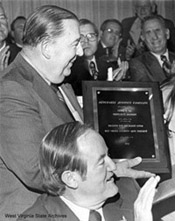
Jennings Randolph with Hubert Humphrey, receiving plaque from WVU Young Democrats for being "Father of the Twenty-Sixth Amendment"
|
As a senator, Randolph also developed several amendments to an act from his early days in Congress: the Randolph-Sheppard Act. With the changes made during the 1970s, the Randolph-Sheppard Act created more opportunities for blind venders.6 Randolph, who served as chairman of the Senate Public and Welfare Committee’s Subcommittee on the Handicapped, shepherded much other legislation through Congress that prevented discrimination against and improved educational opportunities for the handicapped and disabled.
Throughout his political career, Jennings Randolph had also strongly supported the creation of a U.S. Department of Peace. Prior to his retirement, the Senate passed legislation that created the United States Institute of Peace, an institution devoted to nonviolent conflict resolution and international peace.7
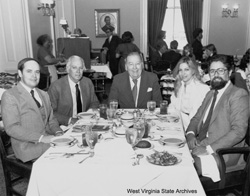
Jennings Randolph with Nick Hollis, Gustavo de los Reyes, Gustavo de los Reyes Jr., and Elena Caldera, Agri-Energy Roundtable, April 3, 1984
|
In the last term of his Senate career, Jennings Randolph turned his focus more toward international affairs. He foresaw that international politics were increasingly driven by the need for food and energy, leading him to work closely with the Agri-Energy Roundtable, an organization developed to promote cooperation on matters of food and energy development between nations. Randolph chaired the Agri-Business Roundtable for ten years and played a vital role in communications with several developing nations on matters of energy and agriculture.8
|
|
Senator Randolph also continued working on many other projects from his early senatorial career, such as developing legislation to improve education throughout the state and the nation, to provide better benefits for the country’s veterans, and to improve the environment. Infrastructure and the interstate highway system also remained vital concerns, and he continued his work on the development of highways that made the state more accessible.
|
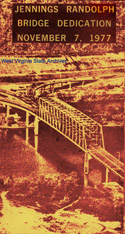
Program, Jennings Randolph Bridge Dedication, November 7, 1977
|
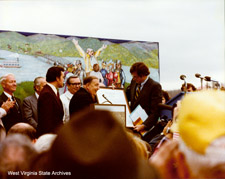
Jennings Randolph with Jay Rockefeller, dedication of Jennings Randolph Bridge, US 30, Chester, West Virginia, November 7, 1977
|
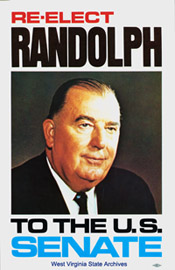
Jennings Randolph Campaign Poster
|
Randolph won re-election with little effort in 1960, 1966, and 1972, but faced a challenge when he ran against former Governor Arch Moore Jr. in 1978. Moore proved to be a strong candidate, forcing Randolph to wage an extensive campaign to keep his seat in the senate. His efforts paid off, however, as he defeated Moore by a narrow margin, receiving 50.5 percent of the state’s votes.9 After winning this election, Randolph decided that he would not seek another term, and Senator Jennings Randolph retired from the United States Senate in 1985, bringing a close to his extraordinary political career.
|
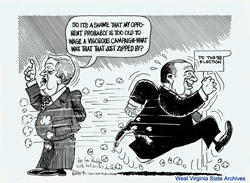
Political cartoon of Jennings Randolph rushing past 1978 opponent Arch Moore
|
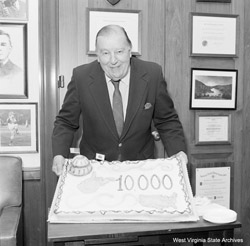
Jennings Randolph with cake, celebration honoring Randolph's 10,000th vote on legislation, September 29, 1982
Citations
1. "History of Mine Safety and Health Legislation," United States Department of Labor, https://arlweb.msha.gov/mshainfo/mshainf2.htm (accessed May 16, 2018).
2. “Black Lung Benefits: An Administrative Review,” Bulletin, Social Security Administration, 1971, https://www.ssa.gov/policy/docs/ssb/v34n10/v34n10p11.pdf (accessed May 16, 2018).
3. "Read What Jennings Randolph has Done for Education and Rehabilitation" Poster, Randolph Collection, WVSA.
4. Michael Barone, "Jennings Randolph."
5. David Stout, "Senator Jennings Randolph of West Virginia Dies at 96," New York Times, May 9, 1998.
6. "H.R.17503 — 93rd Congress (1973-1974)," Congress.gov, https://www.congress.gov/bill/93rd-congress/house-bill/17503 (accessed May 16, 2018).
7. "22 USC Ch. 56: UNITED STATES INSTITUTE OF PEACE," http://uscode.house.gov/view.xhtml?path=/prelim@title22/chapter56&edition=prelim (accessed May 17, 2018).
8. "Jennings Randolph Recognition Project: A Chronicle of an International Leadership Record - Jennings Randolph and The Search for Food and Energy Security (1979-1995)," Agribusiness Council, http://agribusinesscouncil.org/randolph.htm (accessed May 19, 2018).
9. Michael Barone, "Jennings Randolph."
|



